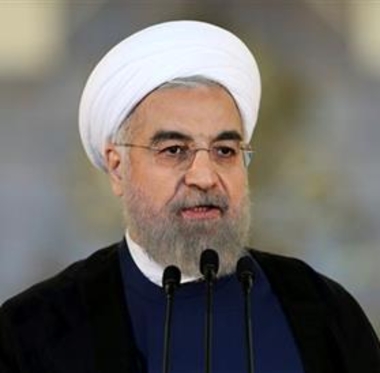Iranians welcome nuclear deal, hope for brighter economy

Tehran, Iran (AP) — Drivers honked their horns and dozens of Iranians cheered in a main square and boulevard of the capital Tehran on Tuesday, welcoming their country's landmark nuclear deal with world powers, which they hope will mean an end to isolation and sanctions that have crippled the economy.
The burst of celebrations underscored the hopes that many Iranians have pinned on the drawn-out talks. That public yearning for economic relief was crucial for winning moderate President Hassan Rouhani the breathing room to negotiate with Iran's nemesis the United States over imposing limits on the nuclear program.
"I'm very happy," gushed Azizieh Habibi,a 46-year-old housewife with two college-age children, who was among those celebrating on Tehran's Vali-e Asr Avenue. Some waved flags, some had painted their faces in the flag's red, white and green colors, chanting thanks to Rouhani and his top negotiator, Foreign Minister Mohammad Javad Zarif.
"My children will have better future since there is no threat of sanctions and restrictions anymore," said Habibi. "They may even go to the U.S. for more education."
A key question now will be whether powerful hard-liners, including the elite Revolutionary Guard, who have spoken staunchly against concessions on Iran's nuclear ambitions, will acquiesce to the accord. They were largely silent Tuesday after the deal's announcement, most likely waiting to see the stance of the supreme leader, Ayatollah Ali Khamenei, who holds the final word on all state matters in Iran.
Khamenei met with Rouhani Tuesday night and expressed his "appreciation and thanks for the honest and diligent efforts" by the negotiating team, according to state TV.
The brief statement was in line with how Khamenei has played his cards close to his chest throughout the negotiations, allowing them continue while rarely weighing in directly beyond sometimes expressing skepticism.
Many were glued to television coverage of the deal's announcement, including President Barack Obama's address — only the second time Iranian state TV has aired him live. The first was his speech when an interim deal was reached earlier this year, paving the way for the new agreement.
At one Tehran electronics shop, men who had gathered around TV screens at the store clapped as Rouhani addressed the nation after Obama's appearance. Among them was shopkeeper Ali Hosseini, 29, who watched both leaders' speeches live.
"I am proud that my country has resolved this critical issue through talks not war," he said.
Many in the Iranian public were well aware of the potential for hardliners to try to undermine the accord.
"Will the revolutionary Guard support the deal?" Hashem Mohammad, 65, asked nervously after watching Rouhani's speech.
The Guard has made no prominent remarks in recent weeks, but media outlets close to them, like the Javan newspaper, have been critical of the negotiations. In its Tuesday edition Javan noted possible positive results of the talks like end of sanction against Iran but added, "even the most optimistic experts have expressed hopelessness about realizing such scenario."
The hardline Rajanews website criticized the deal, saying Iran gave away too much. "Iran has accepted comprehensive limitations (on its nuclear program) in return for suspension of some sanctions."
In his address, the moderate Rouhani sought to sell the deal to the public, underlining that Iran's main goals were all achieved, particularly "continuing its nuclear activities, lifting sanctions," while acknowledging that concessions had to be made.
"Negotiation means give and take. We were not seeking charity, expecting someone to give us something free. We were after negotiations, a fair give and take," he said, vowing that the deal would bring "new hope and a better future for our youth."
Iranians have been suffering for years from the pain of sanctions, which have battered the economy, fueling unemployment. Rouhani's talk of a dialogue with the world — and the lure of an end to sanctions — was key to his victory in 2013 presidential elections. In exchange for agreeing to limits on its nuclear program and new provisions for inspections of Iranian facilities, Iran stands to receive a broad lifting of international sanctions and more than $100 billion in assets frozen overseas.
Even before the deal was formally announced, the value of Iran's riyal rose against the dollar, a sign of optimism over an improved economy.
Pouya Alizadeh, a shop owner in northern Tehran, handed out free sweets to his customers to celebrate the agreement. He hailed Zarif as a hero for his role in sealing the deal.
"What's important for me is that it will bring improvement in business and trade with the outside world," he said.
Some also saw the nuclear deal as a victory for Iran against the U.S. and other world powers.
"Iran defeated the world! We are the champions," cheered Ghasem Kashani, 19, a freshman in Tehran Azad University. "The West learned Iran is right in its position!"
By Nasser Karimi, Associated Press. Copyright 2015 The Associated Press. All rights reserved. This material may not be published, broadcast, rewritten or redistributed.
The Gayly – July 14, 2015 @ 1:50pm.





